Why Failure Can Be a Good Thing
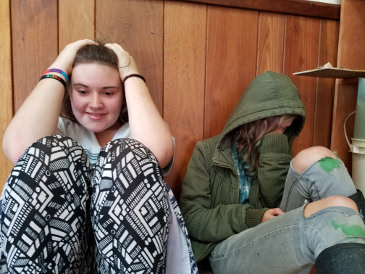
In seventh grade, I experienced my first real academic failure. My science teacher assigned us a large project. We had to research and present about the different organ systems of a specific animal. As an awkward seventh grader, I was not excited about this idea. Puberty and new social dynamics had hit me hard and I was being picked on daily. Getting up in front my bullies to talk about the alligator was not something I was looking forward to doing. So I did what lots of middle schoolers do when faced with a scary prospect: I avoided it.
Middle Schoolers’ Abilities are Changing
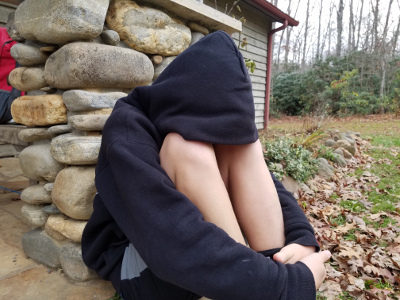 My teacher gave us weeks do to the project. She offered her assistance numerous times. My classmates were working hard, but I did nothing. This was not normal for me. In elementary school, I always did my work on time. I always asked for help. Now I refused to do either.
My teacher gave us weeks do to the project. She offered her assistance numerous times. My classmates were working hard, but I did nothing. This was not normal for me. In elementary school, I always did my work on time. I always asked for help. Now I refused to do either.
Parents are often confused by their middle schooler’s behaviors. Sometimes things their children never had trouble with, like doing homework or getting ready for school in the morning, become major daily obstacles. Adolescents suddenly stop doing things they used to be comfortable doing, like talking with adults or asking for help. For many parents this change can be frustrating. It seems like their child’s executive functioning has taken a nose dive and all the lessons they were carefully taught have been forgotten. When this happens, it’s important for parents to practice patience and acceptance while their teenagers adjust to the changing bodies and new roles in life. It is also important to let them fail.
Failure is Hard, But it’s also Educational
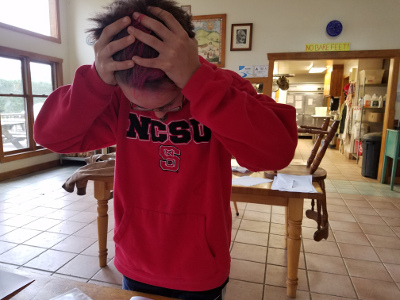 When my project was finally due, I was still woefully unprepared. As I listened to each of my classmates talk about their animals’ digestive systems, my own stomach began to churn. I wasn’t ready, but nothing was going to save me from going up in front of the room.
When my project was finally due, I was still woefully unprepared. As I listened to each of my classmates talk about their animals’ digestive systems, my own stomach began to churn. I wasn’t ready, but nothing was going to save me from going up in front of the room.
As I stood before my class, I recalled the only fact I had managed to find and remember. “The alligator has a three chambered heart!” It was a strong start but it was also all I had. For the next 15 minutes, I repeated that phrase over and over at least two dozen times to the horrified looks of my classmates and teacher. When I sat down, I hid my head on my desk in shame.
Parents don’t want their kids to fail. They remember how awful the feeling of shame was after a failure. As parents, it’s natural to want to protect their children from feeling that pain. But it’s an important part of a young person’s education to experience that failure. Failure offers important lessons:
- We get to reflect on how to do things differently or better the next time.
- We see that our actions have real consequences.
- It helps us recognize that failing that isn’t the end of the world.
Trying to Prevent Failure Leads to Anxiety
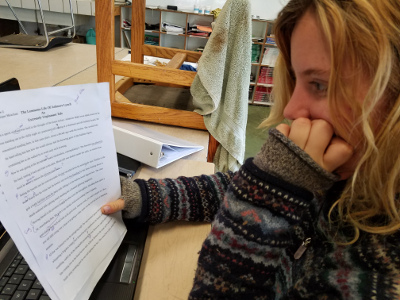 So often middle schoolers won’t even try a new activity because they are afraid they won’t be good at it. Instead, they stick to academic subjects, sports and hobbies that they know. As parents, we sometimes make these fears worse by trying to prevent failure. Pushing middle schoolers to do the things they are supposed to do might feel like the way to teach responsibility, but it creates a false motivation. We try to prevent moments of potential failure, but end up creating a space where our children just feel anxious. They get the message that they have to do everything right the first time and cannot fail.
So often middle schoolers won’t even try a new activity because they are afraid they won’t be good at it. Instead, they stick to academic subjects, sports and hobbies that they know. As parents, we sometimes make these fears worse by trying to prevent failure. Pushing middle schoolers to do the things they are supposed to do might feel like the way to teach responsibility, but it creates a false motivation. We try to prevent moments of potential failure, but end up creating a space where our children just feel anxious. They get the message that they have to do everything right the first time and cannot fail.
Our Academic Advisor Program helps students find success in a multitude of ways.
Learn More
As an Academic Advisor at Arthur Morgan School, when I can tell that it is going to be a fight to get a student to do their work, sometime I let them fail. Every Thanksgiving, a handful of students are giving their first student-led conference. In the thirty minute presentation for their parents, they describe their classes, explain their best work, and evaluate themselves as students. They have plenty of time to make their portfolio pieces. Help is always available to them. However, many first year students still procrastinate and avoid preparing for it.
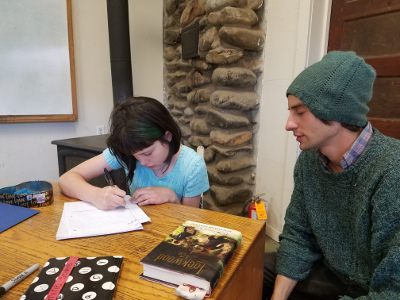 I could push them to do it. I could sit them down at a desk and make them write out their words that they will then recite. Sometimes I am tempted to write the cards for them, but I don’t. Instead, I let them fail.
I could push them to do it. I could sit them down at a desk and make them write out their words that they will then recite. Sometimes I am tempted to write the cards for them, but I don’t. Instead, I let them fail.
Failure Teaches Us It’s OK to Make Mistakes
When I finished my alligator presentation on that horrific day in seventh grade, I learned two things. The first was that although I was embarrassed and ashamed, nothing else bad happened. Many of my fellow students even showed compassion toward me. They too had crashed and burned at times and understood how it felt. Yes, I had failed, but it was okay and I knew if I failed again I would be okay then, too. When I encounter something I don’t know how to do, I feel confident trying, knowing that life will go on if I mess up.
Failure Teaches us How to Do It Better
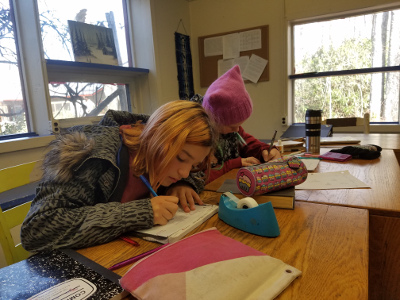 The second lesson was that even if failure was okay, I didn’t like it and wanted to avoid it if I could. From then on, I never procrastinated on a project. I still failed from time to time, but I learned to get my work done on time. To this day whenever I feel lazy, I still think about the alligator.
The second lesson was that even if failure was okay, I didn’t like it and wanted to avoid it if I could. From then on, I never procrastinated on a project. I still failed from time to time, but I learned to get my work done on time. To this day whenever I feel lazy, I still think about the alligator.
I try to provide very similar lessons for my academic advisees. If they want to fail, I let them. Several times, I have sat through almost 30 minutes of silence as a student shows up completely unprepared for their conference. At times I need to stifle a knowing smile when I hear them repeat a single phrase over and over.
I don’t rescue them from this moment. I let them feel it completely. They sense their parent’s disappointment. They feel ashamed and embarrassed, but the whole time they are learning. Those students are learning to fail and learning they don’t want to do it again.
Often times the students I let fail end up being my hardest workers the next year. They try to tell the newer students, “Don’t procrastinate! I had to stare at my parents for 30 minutes in silence. It was awful!” Sometimes the other students take these warnings seriously, but I don’t worry about it if they I don’t. After all, the worst thing they could do is fail.
-Nicholas Maldonado
